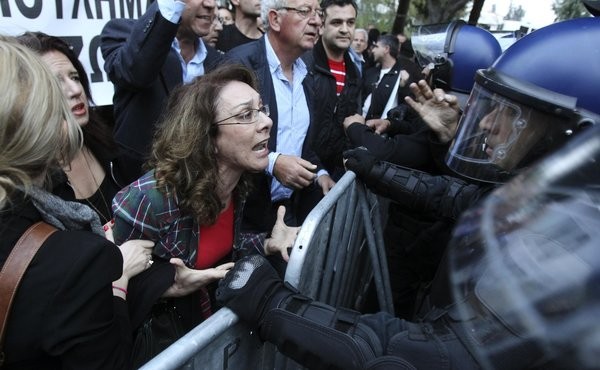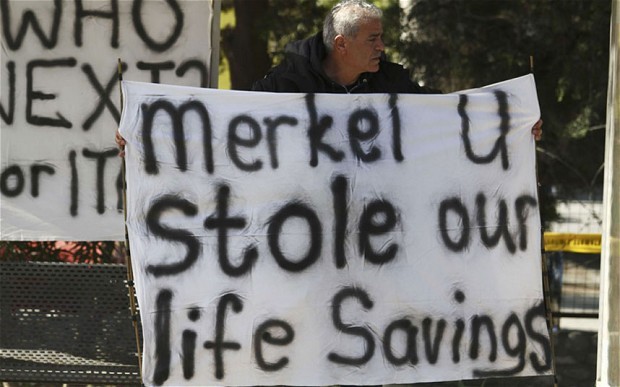Assessing the Cyprus Bailout
Post on: 16 Март, 2015 No Comment

By William Alden March 19, 2013 7:33 am March 19, 2013 7:33 am
The European plan to take money from bank depositors to help pay for a bailout of Cyprus has set off alarm bells among some analysts and politicians. But the move, far from setting a precedent for other countries, has a lot to do with the particulars of Cyprus, Andrew Ross Sorkin writes in the DealBook column .
The proposal has understandably caused turmoil and anger in that part of the world. “A bailout deal that was supposed to calm a financial crisis in an economically insignificant Mediterranean nation spread it wider,” The New York Times writes. The fear among analysts is that imposing a levy on depositors could create a dangerous precedent and, in a doomsday scenario, prompt depositors to move their money elsewhere.
But that does not seem likely to happen, some observers argue. “I would assume that anyone in Spain, Portugal or elsewhere who knows about the taxation of Cypriot depositors also would know that the Cypriot banking system is a very different animal than anywhere else in the euro zone ,” Erik Nielsen, chief economist at UniCredit, wrote in a note to clients. Mr. Sorkin writes: “Cyprus is unique. Besides being tiny, its banking system looks different from those in most other countries. Much of the big money deposited in its banks is from foreign investors, including Russians who have long been suspected of money laundering. Those investors had fair warning that Cypriot banks were troubled.”
As for the bailout’s implications for Europe, there may be an upside. The willingness to impose so-called haircuts on depositors “shows that the European Union is still grappling for ways to reduce the region’s debt levels, a process known as de-leveraging,” DealBook’s Peter Eavis writes. “Some experts think Europe’s economy and employment levels won’t grow in earnest until debt is substantially reduced. As a result, they are, with some reservations, optimistic after the moves taken in Cyprus.”
OBSTACLES TO A HIGHER PRICE FOR DELL | Shareholders of Dell appear to be expecting a higher bid than the offer of $13.65 a share by the company’s founder, Michael S. Dell, and the private equity firm Silver Lake. But a richer offer may not readily materialize, DealBook’s Michael J. de la Merced writes .
For one thing, the current bidders may not be willing, or able, to pay more than their $24.4 billion offer. “Here’s one way of looking at it: Raising the bid by a dollar a share would cost about $1.8 billion, so getting to the $15-a-share bid that some analysts see as necessary would add about $2.3 billion to the deal’s price. It’s unclear who might bear the cost of providing the additional capital,” Mr. de la Merced says. “Silver Lake is balking at adding more money to the deal, according to people briefed on thinking at the private equity firm.”

The second possibility would be for a competing bid to emerge as part of the so-called go-shop process, which has attracted the likes of Hewlett-Packard, Lenovo and the Blackstone Group. But it’s unclear whether anything definitive will come from the go-shop process. H.P. and Lenovo are widely seen as taking a free look at their rival’s books,” as was Blackstone. Although none were expected to bid, Bloomberg News reports that Blackstone may change its mind.
WHAT’S NEXT FOR SAC | The $616 million penalty that SAC Capital Advisors is paying to resolve insider trading lawsuits does not end the possible legal troubles for the giant hedge fund. The firm’s president told investors on a conference call on Monday that the scrutiny could continue. according to The Wall Street Journal. Friday’s settlements suggested that the Securities and Exchange Commission “concluded that there was enough evidence to go after SAC itself for its involvement” in suspicious trading, DealBook’s Peter J. Henning writes in the White Collar Watch column. “Because the CR Intrinsic settlement deals only with trading in Wyeth and Elan shares in late July 2008, the S.E.C. is free to pursue additional transactions by SAC in those companies if there is evidence that it received other inside information.”
“One problem the agency could face in pursuing a case involving earlier trading, however, is that a recent Supreme Court decision limits its ability to obtain penalties for violations that are more than five years old, unless the firm waived the statute of limitations.”
ON THE AGENDA | The Frankfurt Finance Summit features speeches by, among others, Jens Weidmann. the president of the Bundesbank; Christine Lagarde. the managing director of the International Monetary Fund; and Anshu Jain. the co-chief executive of Deutsche Bank. A Senate Judiciary subcommittee holds a hearing at 10 a.m. about the effects of a merger between American Airlines and US Airways. A Senate Banking subcommittee has a hearing at 3 p.m. about improving regulation and increasing competition in insurance markets. Adobe Systems reports earnings after the market closes. Richard Branson of Virgin is on CNBC at 8 a.m. Michael O’Leary. chief of Ryanair, is on Bloomberg TV at 9:45 a.m.














